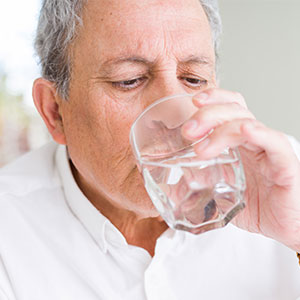You might be noticing some changes as you get older: You’re getting winded easier and you’re wondering why book or magazine print has suddenly shrunk (it didn’t). Perhaps you’ve also noticed your mouth seems drier more often.
It could be a condition called xerostomia, in which your body isn’t producing enough saliva. Older people are more prone to it because it’s often a side effect of prescription drugs that can inhibit saliva production. Because seniors tend to take more medications than other age groups, xerostomia is a more common problem for them.
Xerostomia isn’t a pleasant experience. More importantly, it’s hazardous to your oral health. Saliva contains antibodies that fight bacterial infection, and it also neutralizes mouth acid that causes tooth decay. A lack of saliva puts you at greater risk for both tooth decay and gum disease.
Fortunately, there are things you can do to alleviate or ease the effects of xerostomia.
Cut back on spicy foods and caffeinated beverages. Spicy or salty foods can irritate your gum tissues and worsen dry mouth symptoms. Because it’s a diuretic, caffeine causes you to lose more fluid, something you can’t afford with xerostomia. Cutting back on both will improve your symptoms.
Drink more water. Increasing your daily water intake can help you produce more saliva. It also washes away food particles bacteria feed on and dilutes acid buildup, which can reduce your risk for dental disease.
Talk to your doctor and dentist. If you’re taking medications with dry mouth side effects, ask your doctor about other alternatives. You can also ask your dentist about products you can use to boost saliva production.
Practice daily hygiene. Daily hygiene is important for everyone, but especially for those whose saliva flow is sub-par. Brushing and flossing clear away dental plaque, the top cause for dental disease. Along with regular dental visits, this practice can significantly reduce your risk for tooth decay and gum disease.
Taking these steps can help you avoid the discomfort that often accompanies xerostomia. It could also help you prevent diseases that could rob you of your dental health.
If you would like more information on dealing with dry mouth, please contact us or schedule an appointment for a consultation. You can also learn more about this topic by reading the Dear Doctor magazine article “10 Tips for Dealing With Dry Mouth.”




